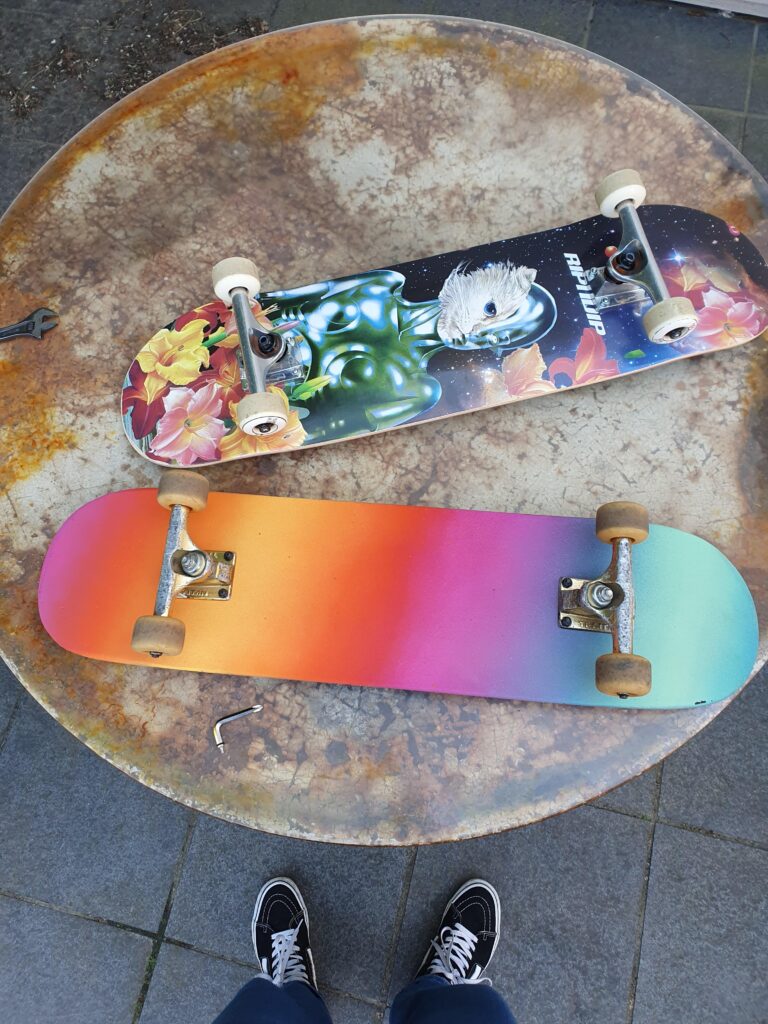If you’re afraid to go to the skatepark, start by practicing on a smooth and flat surface until you gain confidence. Once you feel comfortable, gradually progress to more challenging terrain and take it one step at a time.
Skateboarding has gained tremendous popularity over the years, and many people are now enjoying its benefits. However, for beginners, it can be intimidating stepping into a skatepark filled with skilled skateboarders. Fear not; there are several ways to overcome this fear of the unknown. In this article, we will explore various techniques on how to gain confidence and improve your skateboarding skills. From finding suitable skate spots to tips and tricks to help you progress safely, this guide will help you become a confident skater. So, whether you’re a first-time skateboarder or looking to enhance your skills, this article is for you.

Credit: www.oregonhumanities.org
The Psychology Of Fear In Skateboarding
Skateboarding is an adrenaline-packed activity that attracts people of all ages. However, fear and anxiety can set in while skateboarding, leaving even the most experienced skateboarders feeling overwhelmed. In this blog post, we’ll discuss the psychology of fear in skateboarding and how it affects performance.
We’ll also provide some tips on how to overcome fear and anxiety to become a successful skateboarder.
How Does Fear And Anxiety Affect Skateboarding Performance?
Fear and anxiety can negatively impact skateboarding performance in many ways.
- Fear can cause a skateboarder to hesitate, lose focus, or even freeze.
- It can affect the body’s physical response, causing a skater to be stiff or shaky, affecting balance and timing.
- It can lead to injury, as hesitation and fear can cause the skateboarder to make mistakes.
The Role Of Fear In Learning New Tricks And How To Manage It.
Learning new tricks is a fundamental aspect of skateboarding, but it can also be terrifying. Fear can impede progress, leaving an aspiring skateboarder feeling stuck in their development.
- Start small. Break down the trick into smaller parts and practice each step until you feel comfortable. Once you have perfected each step, put them together.
- Visualize successfully landing the trick. Visualization can help reduce anxiety by creating a sense of familiarity and confidence in your mind.
- Learn from others. Reach out to skilled skateboarders and ask for their mentorship or advice.
- Put safety first. Wear the appropriate protection gear to reduce the fear of getting hurt.
How To Balance Adrenaline And Caution In Skateboarding.
Skateboarding is an adrenaline-fuelled sport, which can make skaters more prone to impulsivity and recklessness.
- Know your limits and stay within them. Don’t push yourself too hard, too quickly.
- Stay present. Focus on the present moment and the task at hand, rather than worrying about past or future outcomes.
- Trust your instincts. If something doesn’t feel right, don’t push it. Listen to your intuition and make smart decisions to stay safe.
- Practice mindfulness. Mindful meditation can help improve focus, reduce anxiety, and increase overall well-being.
Fear and anxiety play a significant role in skateboarding. However, with proper planning and preparation, skaters can overcome their fears and become successful in the sport. By following the tips provided in this blog post, you can learn how to manage fear and balance adrenaline to become a better skateboarder.
Recognizing The Root Of Anxiety
Skateboarding can be a fun and exhilarating activity, but it can also be a source of anxiety for some individuals. For those who are afraid to go to skatepark, the experience can be overwhelming and intimidating. However, recognizing the root of one’s anxiety can help in overcoming this fear.
In this blog post, we will explore the various reasons why people may be afraid to go to skateparks and how to identify these root causes to help alleviate the anxiety associated with skateboarding.
Identifying The Reasons For The Fear Of Skateparks
Skateparks may be intimidating for a variety of reasons, including:
- Trauma: if an individual has experienced a traumatic event related to skateboarding, it may create an aversion to the activity.
- Lack of confidence: some individuals may lack confidence in their skateboarding abilities or fear looking foolish in front of others.
- Social anxiety: the fear of being judged or ridiculed by others can make skateboarding in front of others a daunting prospect.
- Fear of injury: the potential for injury is always present when skateboarding, and for some, this fear can be overwhelming.
- Negative past experiences: previous negative experiences with skateboarding, such as falling or being made fun of, can create an aversion to the activity.
Understanding The Impact Of Past Experiences
Past experiences can have a significant impact on an individual’s current behavior and emotions, including their fear of skateboarding. Negative experiences can create aversions to the activity, which can be difficult to overcome. Understanding the impact of these experiences and addressing them can help individuals move past their fear and enjoy skateboarding without anxiety.
Recognizing the root of one’s fear of skateboarding can help alleviate anxiety and lead to a more enjoyable experience. By identifying the reasons behind their fear, individuals can address these issues and move past them. With proper support and practice, even those who are afraid to go to skateparks can overcome their anxiety and enjoy the activity.
So, go ahead and grab your skateboard, conquer your fears, and skate like a pro!
The #1 Way to Get Over the Fear of Falling in Skateboarding
Overcoming Skatepark Anxiety
Skateboarding is an excellent way to remain active and engaged in physical activity, but it can also cause anxiety for some who aren’t used to it. You might feel overwhelmed, intimidated, or out of place, especially if you’re a beginner.
If this sounds like you, don’t worry; you’re not alone. Most skateboarders have experienced fears at one point or another, but there are various techniques to help you overcome this fear. This piece will explore effective ways to help you overcome your anxiety and enjoy skateboarding.
Practical Steps To Conquer The Fear Of Skateparks
Overcoming your anxiety and enjoying skateboarding is possible.
- visualization
This is one effective technique that has assisted many skaters to overcome fears and anxieties. Visualize yourself doing stunts and successfully executing it, as visualization can help you gain confidence.
- incremental exposure
Start small, and gradually increase your exposure to more complex activities at the skatepark. Begin with an easy terrain on your first visit, and then move up to more complicated routes. This will increase your confidence and eliminate nervousness gradually.
- positive self-talk
It is crucial to remind yourself that you are better than your thoughts. Recite positive affirmations to yourself, such as “i can do this, i am confident and able to learn”. This technique has worked for numerous people who previously experienced anxiety.
- desensitization
Gradually expose yourself to whatever is causing you to feel anxious. Challenge yourself to complete that skill that scares you so much. It will take time, patience, and practice, but you will no longer feel anxious once you master the skill.
Tips From Experienced Skaters
Here are some tips from experienced skaters who have overcome similar fears and challenges:
- Start with basic skateboarding skills by practicing on smooth pavement or driveways before trying out the skatepark.
- Don’t compare yourself to other experienced skaters. Embrace your pace and focus on your progress and not perfection.
- Surround yourself with skateboarders who are friendly, positive, and willing to help.
- Face the fear head-on and laugh at your mess-ups.
Seeking Professional Help For Persistent Anxiety And Mental Health Issues
In case your anxiety persists, and you experience panic attacks or depression, don’t hesitate to seek professional help. Reach out to a counselor or mental health professional to help you manage your ongoing anxiety, and if necessary, recommend treatment options.
Overcoming fear and anxiety while skateboarding is possible. Begin with the practical steps outlined above, remember tips from experienced skaters, and seek professional help where necessary. With time, practice, and patience, you will achieve optimal skateboarding success.
Creating A Safe Skatepark Environment
Skateboarding is a sport and recreational activity enjoyed by many individuals around the world. However, for some, going to a skatepark can be a nerve-wracking experience due to the fear of bullying, harassment, or discrimination. It is the responsibility of the community, fellow skaters, and skatepark managers to ensure that everyone feels welcome and safe.
This article will explore the strategies to create a safe skatepark environment, including preventing bullying, harassment, and discrimination, and the resources and organizations that support safe and inclusive skateboarding culture.
The Responsibility Of Community, Fellow Skaters, And Skatepark Managers To Make Everyone Feel Welcome And Safe.
- The community needs to embrace skateboarding as a positive activity and promote a safe environment in which to participate.
- Fellow skaters should encourage and support other skaters regardless of their gender, race, or skill level.
- Skatepark managers should create and enforce a code of conduct that promotes respectful behavior and ensures the safety of all users.
- It is essential to educate and raise awareness about the importance of inclusivity and respect towards all individuals at the skatepark.
Strategies To Prevent Bullying, Harassment, And Discrimination In Skateparks.
- First and foremost, a zero-tolerance policy towards bullying, harassment, and discrimination must be implemented and enforced.
- It is vital to educate skaters about the harmful effects of such behavior and the importance of being respectful towards others.
- Encouraging open communication and creating a safe space for individuals to report incidents of bullying, harassment, or discrimination is crucial.
- Community engagement programs such as workshops and clinics can be organized to promote a positive and inclusive skateboarding culture.
Resources And Organizations That Support Safe And Inclusive Skateboarding Culture.
- The international association of skateboard companies (iasc) has a safe skateboarding program that promotes a safe and inclusive skateboarding environment.
- The anti-defamation league’s no place for hate program provides resources for schools and community organizations to address and prevent discrimination and bullying.
- The skatepark project advocates for free, quality skateparks accessible to all and aims to promote safe and inclusive skateboarding.
- The international women’s skateboarding coalition (iwsc) focuses on creating opportunities and promoting gender equality within skateboarding.
- The national inclusion project strives to ensure that children with disabilities are included in recreational activities.
By following these strategies and utilizing available resources, we can create safe and welcoming environments for all individuals at skateparks. Together, we can promote a positive and inclusive skateboarding culture that fosters growth, learning, and fun for all participants.
Conclusion
Fear of going to the skatepark is a common feeling among skateboard enthusiasts, beginners or experienced ones alike. However, it is essential to remember that fear is just an emotion and that with the proper mindset and strategies, it can be overcome.
Start by identifying what specifically frightens you about going to the skatepark, and then create a plan to address it. Whether it is attending a class or going with a friend, there is always a way to make it easier on yourself.
Building your confidence may take time, but it will happen if you push yourself out of your comfort zone. Finally, remember that skateboarding is an individual sport, and no one is judging you for your skills or lack of it.
By taking the first step, the feeling of fear will eventually fade away, and you will be left with the pure joy that comes with skateboarding.



